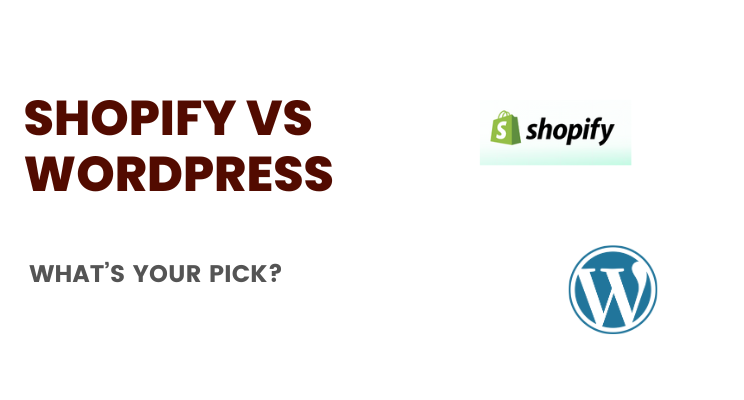This Shopify Vs WordPress comparison comes in now because the time is just right. WordPress is popular and as a rich ecosystem of themes, plugins, products, hosting solutions. Meanwhile, Shopify is ever popular for starting eCommerce stores (including digital products).
The WordPress space is maturing and it’s a platform that gives you complete control over design, technical aspects of managing your website, content management, and also eCommerce.
WordPress is unbelievably flexible, dominant, and unshakeable juggernaut. As Andrew Hickey puts it:
“When it comes to content management systems (CMSs), WordPress is a dominant force. It powers more than 23 percent of the web and more than 60 million sites. And it’s growing by the second.”
Meanwhile, Shopify is a true behemoth as far as eCommerce is concerned.
If all that you wanted was an eCommerce store (and not a business website, a blog, a full-fledged publication, a portal, a directory, or a combination thereof), Shopify is all that you need.
Let’s admit it: just when we things are getting so much better and easier thanks to technology, we are simultaneously presented with another problem: just what the heck will you choose as the right platform for your eCommerce business?
Between Shopify and WordPress, it’s a delicate comparison since both platforms are incredible choices.
But let’s address the elephant in the room…
WordPress for eCommerce: Who is That Really For?
Here are a few observations about websites, eCommerce, and the way most people or businesses whoever needs a website are like:
Business owners want to do “business” and there’s enough to worry about even for the smallest of businesses.
For an eCommerce business, it starts with branding. Then, there’s the product, stock procurement, inventory management, packaging, shipping, logistics, vendor management, accounting, compliance, and so much more.
Most ordinary folks (the non-tech types or those who don’t want to deal with technical nitty-gritty) don’t take care of their websites well enough — plugins and themes are not updated regularly; most websites are on shared hosting which is a disaster waiting to happen; vulnerable scripts, malware, and hacking attempts are too real.
If you add eCommerce to this ground reality, a poorly managed WordPress eCommerce setup is at huge risk (with the business itself, customer details, financial information, and a lot more)
Clearly then, your choice of using WordPress for eCommerce comes down to a miniature checklist:
- Using WordPress for eCommerce will mean that you’ll need to choose managed WordPress hosting solutions. Your regular shared hosting won’t do (Don’t even try). Are you up for it?
- Can you be absolutely sure that you’ll take care of your WordPress eCommerce website the way you should?
- If you don’t want to deal with it, Could you maybe hire a team, get help from experts to manage your site, or at least let premium WordPress managed hosts do half the work (fast page speeds, malware prevention, hacking protection, CDN, and SSL certificates)?
If your answer is yes for the questions above, WordPress for eCommerce is an easy choice to make.
Pros:
- WordPress is open source and it has the richest ecosystem of plugins, themes, WordPress hosting solutions, and many marketing tools. You just can’t beat that.
- WordPress lets you have absolute control over every single aspect of your eCommerce website — from eCommerce itself to website management to the detail.
- WordPress is “marketing ready” — the rest of the world is busy building apps, tools, and SaaS products for WordPress.
Cons:
- WordPress isn’t cheap (I don’t know what you were thinking)
- WordPress for eCommerce demands the best of WordPress managed hosting.
- WordPress for eCommerce necessitates high levels of care, maintenance, and attention to detail.
If not…
Shopify for hassle-free eCommerce
Shopify takes out the hassle of having to maintain a hundred different things to keep your eCommerce business safe. Your eCommerce store is hosted for you so you don’t have to.
Shopify comes with safety, security, and security. Every Shopify theme you work with and the apps you’ll choose to keep your store running or to manage various other business functions such as inventory, digital product delivery, payroll, etc., are tested before they go live for you to use.
With Shopify, you don’t worry about hosting, malware, bad scripts, site downtime, or page speeds — these are taken care of, for you.
Shopify is the perfect solution for anyone who only wants to do with the eCommerce “business” side of things.
Pros of Shopify:
- Shopify takes all the hassles of hosting, management, security, and compliance away.
- With Shopify, your only focus is your actual eCommerce business (what you sell, to whom you sell, how you ship, and more)
- Shopify — like WordPress — is extremely popular with its own ecosystem of apps and themes. You also have most of the marketing, analytics, and management tools built for Shopify.
- Shopify has several built-in tools and extensions built for commerce — such as Shopify POS, Shopify Email, Shopify Automations, and more. Plus, you have Shopify apps (think of these as the equivalent of plugins for WordPress).
Read more: Shopify Review: Why You Should Stop Futzing Around & Switch to Shopify
Cons of Shopify:
- You really have no control over a few aspects such as the speed at which your Shopify eCommerce store loads. You just don’t.
- On top of Shopify’s own theme designer and unless you use special themes such as Booster or a drag-and-drop builder for Shopify such as eComposer, the degree of flexibility for storefront changes are limited (compared to WordPress).
- You are restricted to the themes available on the Shopify stores and elsewhere in third-party markets.
- If you need any level of customization beyond what you see on a Shopify theme store, you’ll need to take on the help of Shopify experts.
Shopify Vs WordPress: What works great for digital marketing?
Thankfully, both Shopify and WordPress are fantastic platforms even from a marketing standout. They come with fabulous content management systems (although WordPress scores over Shopify here, slightly).
Most of the popular marketing tools such as Unbounce, MailerLite, Drip, Mailchimp, Leadpages, ConvertKit, and many others work directly with both WordPress and Shopify.
Each of the platforms, by themselves, also have dedicated marketing apps developed for either of the eCommerce store solutions (such as specific apps built for Shopify and a few others built exclusively for WordPress).
TL,DR
Shopify is for you if you don’t mind letting go of some control for the hassle-free experience of setting up and running an eCommerce store. What you get is an opportunity to focus only on running your business and not on the technical nitty-gritty.
WordPress For Ecommerce is for you if you want to take complete control over how your website is designed, how fast your website loads, and every other single aspect of running your eCommerce business.
Both platforms are primed for marketing (so, I won’t complain).
What will you choose between Shopify & WordPress, and why?


